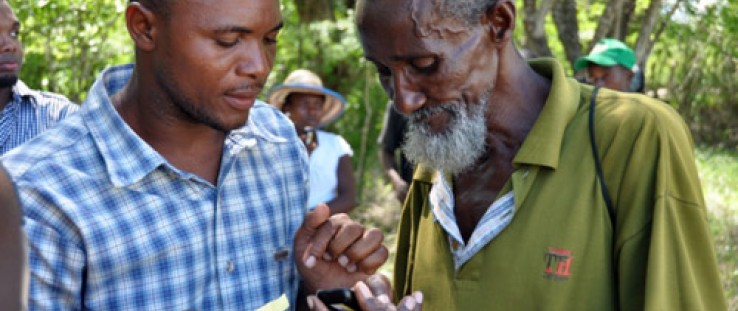 The man on the left explains how to use mobile money in Haiti's Pandiassou community as part of a USAID grant to Mercy Corps.
Fabiola Coupet, Mercy Corps
The man on the left explains how to use mobile money in Haiti's Pandiassou community as part of a USAID grant to Mercy Corps.
Fabiola Coupet, Mercy Corps
 The man on the left explains how to use mobile money in Haiti's Pandiassou community as part of a USAID grant to Mercy Corps.
Fabiola Coupet, Mercy Corps
The man on the left explains how to use mobile money in Haiti's Pandiassou community as part of a USAID grant to Mercy Corps.
Fabiola Coupet, Mercy Corps
Imagine a world without bank accounts. Forget the conveniences of direct deposits, checks, and wire transfers. Distance yourself from the luxuries of credit cards, loans, and retirement funds. In this unpleasant fiction, ATMs, CDs, and 401(k)s are MIA.
This was the unfortunate reality for nine out of 10 Haitians on Jan. 11, 2010. The next day, an earthquake struck, which destroyed a third of the country's few existing bank branches, further limiting access to financial services.
Access to even basic services like savings, cash withdrawals, and money transfers are much more than modern conveniences. They empower the poor, who are least equipped to cope with unexpected events, and, in some cases, help them avoid financial catastrophe.
The dearth of banking services has been one of many hurdles to Haiti's economic growth. But a new technology has arrived in Haiti that could transform personal banking.
Leading mobile telecommunications operators recently launched a mobile money service in the country, putting the power of cash deposits, withdrawals, and person-to-person transfers into the palms of Haitian hands.
Along with traditional banking services, mobile banking also facilitates everyday transactions, allowing Haitians to store money on a cell phone's identification, or SIM card, and purchase goods—anything from a loaf of bread to building supplies—by entering a personal identification number, or PIN. Once a transaction is completed, both buyer and seller receive a message confirming that the money was successfully transferred.
Harnessing the Private Sector
USAID and the Bill and Melinda Gates Foundation partnered on the Haiti Mobile Money Initiative (HMMI) to bring innovative mobile technologies to the island nation. HMMI is a $10 million incentive fund designed to expand access to financial services in Haiti by harnessing the power of the private sector.
Under the initiative, companies like Digicel and Voilà, leading mobile phone networks in Haiti, compete for cash prizes that are awarded once a company reaches milestones set by the competition criteria. Digicel won the first tranche of money, a $2.5 million prize, in January for being the first competitor to provide the service within the established criteria. The HMMI's verification process ensured that Digicel launched the service within six months of the award's announcement in June 2010, and processed 10,000 mobile money transactions through a network of at least 100 new agents.
"The launch of mobile money is an encouraging achievement," said USAID/Haiti Mission Director Carleene Dei. "The additional $1.5 million for the Second-to-Market [the second company to launch the service within the established criteria] award and $6 million in scaling awards will help mobile money become sustainable in Haiti."
The Next Kenya?
The vast majority of Haitians without access to banks carry their cash with them or store it in their home. This is risky, especially for those Haitians living in shelters and tents that don't have locks.
But the technology's precedent is encouraging. Mobile banking is already beginning to reduce the risks and costs of monetary transactions, increase savings, and generate employment in other countries. In Kenya, the trailblazer of sorts in mobile money technologies, Safaricom's mobile banking service M-PESA has 12 million customers—more than half of all adult Kenyans—according to a recent study by Ignacio Mas and Daniel Radcliffe of the Gates Foundation. M-PESA customers pay for everything from taxi fares to school fees through their phones.
The benefits in Haiti could even outpace those seen in Kenya. Haitians living in the United States and other wealthy countries send large sums of money to family members and friends who struggle with high unemployment back home. Mobile money can make it easier and exponentially cheaper to send these remittances, which already put $1.5 to $1.8 billion into the hands of Haitians every year according to Dilip Ratha, a remittance expert at the World Bank. While money transfer companies can charge up to 10 percent for this cash, cell phone companies charge only 1 percent, meaning hundreds of millions of dollars more stay in the hands of those who most need it.
The Developed World Next?
In a sense, mobile money is an example of an innovation tailored for the developing world that the developed world has begun to covet. In a recent opinion piece for The New York Times, columnist Nicholas Kristof described the mobile banking revolution he saw taking place on a recent trip to the Caribbean nation, signing off with: "Some day, I'm pretty sure, I'll engage in as sophisticated a financial transaction as Haitians—say, walking into a deli and buying a pastrami on rye with my BlackBerry—without even leaving Manhattan."
But while in the United States this would be a luxury, in Haiti it is responding to very real challenges: a limited banking infrastructure, high transfer fees, and a lack of steady income and banking culture—a convergence of factors that all lead to the inability to save. Until now.
It's too soon to tell if mobile money will become as successful as it is in Kenya, but it looks promising. Three-fourths of Haitians own a mobile phone. Mobile money services are already being offered by three companies. More generally, mobile technology's biggest advocates are hoping that the new initiative could eventually become a "leapfrog" technology, an innovation with such profound effects that it can help developing nations make up for decades of being left in the developed world's wake.
"The mobile money partnership with the Gates Foundation and this bold approach to private sector solutions holds the promise to enable millions of families to be a part of the formal financial system so that they can safely save their money and, in time, finance their way to a better education, better housing, and a better life," said USAID Administrator Rajiv Shah.
The launch of the mobile money service in Haiti is the result of cooperation among the mobile money networks, their bank partners, and the financial and communications regulatory authorities. Collaboration with the Haitian Central Bank from the onset of the competition will help to provide for sustainable mobile money service countrywide.
Early signs of progress are due in large part to the leadership of Haitian and international institutions. The future of mobile money in Haiti will likely depend on their sustained leadership.









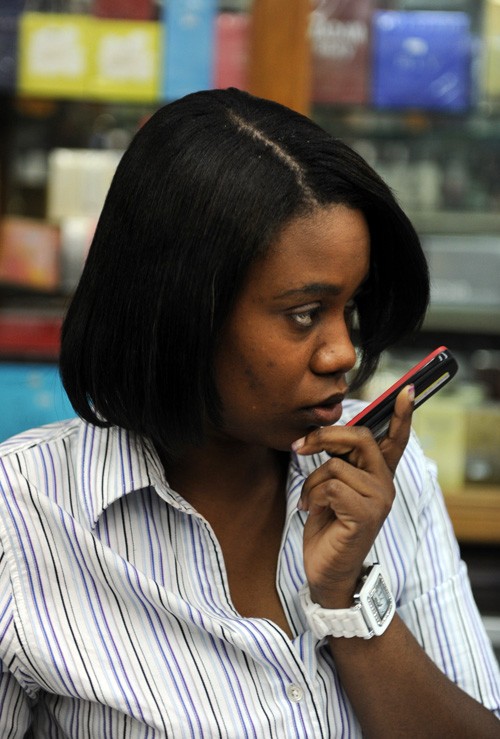
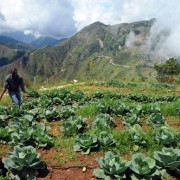
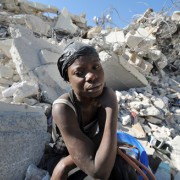
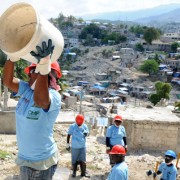
Comment
Make a general inquiry or suggest an improvement.